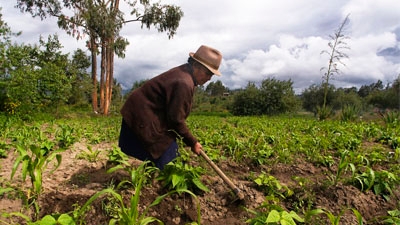“Irrigation is life. We live and eat from our lands; if there is no water, there is nothing,” said Hilda Rosalía Allaica Guamán, president of the Daldal Irrigation Board of Pungalá Parish, Chimborazo Province.
Like Hilda, some three thousand farmers and their families have improved their quality of life by expanding and diversifying their crop production. This provides food security for their families, fodder for livestock and more produce for marketing.
The Chimborazo Development Investment Project (PIDD) is financed by the World Bank through the Chimborazo autonomous government.
The project aims to increase production and market access of rural families living in the Chambo and Chanchan-Chimbo river basins within Chimborazo Province through investments in irrigation and road improvement.
Four demonstration plots have confirmed the benefits of automated irrigation in increasing production. This has led farmers to plant other crops of high market value, such as pea, corn, bean, potato, carrot, radish and fodder such as alfalfa.
Don Segundo Cando, a resident of Lucerito community in Riobamba Canton, explained how the project has changed his life: “I used to cut wood; sometimes I would have to be away from home for eight to 15 days. Now I work exclusively on my plots and everything I produce benefits my family.”

